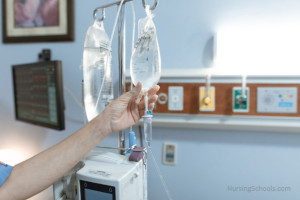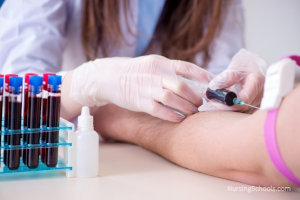HIV/AIDS Nurse
Healthcare Career Guide
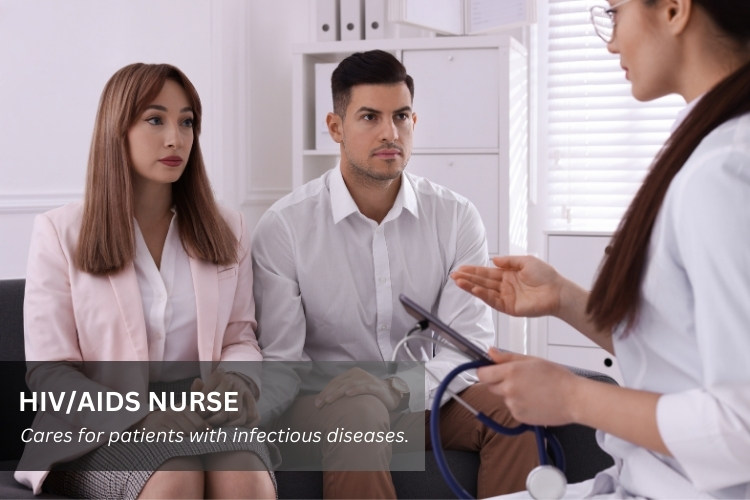
Overview
What is an HIV/AIDS Nurse?
An HIV/AIDS Nurse specializes in providing care, treatment, and support to individuals living with Human Immunodeficiency Virus (HIV) and Acquired Immunodeficiency Syndrome (AIDS). These nurses play a critical role in disease management, education, and prevention efforts to help patients maintain their health and improve their quality of life.
HIV/AIDS Nurses work in hospitals, public health clinics, infectious disease units, and community outreach programs. They administer antiretroviral therapy (ART), monitor patients for complications, and educate individuals on safe practices to prevent the spread of HIV.
This career requires a combination of clinical expertise, patient education skills, and compassion to support individuals affected by HIV/AIDS and to reduce the stigma surrounding the condition.
Education
How Do I Become an HIV/AIDS Nurse?
Becoming an HIV/AIDS Nurse requires education, clinical experience, certification, and specialized infectious diseases training. Follow these steps to enter this challenging and rewarding healthcare career:
- Earn a Nursing Degree. Complete an Associate Degree in Nursing (ADN) or Bachelor of Science in Nursing (BSN). A BSN is preferred for advanced roles in HIV/AIDS nursing.
- Pass the NCLEX-RN. Obtain your nursing license by passing the National Council Licensure Examination for Registered Nurses (NCLEX-RN).
- Gain Clinical Experience. Work as a Registered Nurse (RN) in infectious disease units, public health clinics, or community health organizations.
- Obtain HIV/AIDS Nursing Certification. Earn certification through the Association of Nurses in AIDS Care (ANAC), such as the AIDS Certified Registered Nurse (ACRN) credential.
- Continue Professional Development. Stay informed on advancements in HIV treatment and prevention by participating in continuing education programs and research initiatives.
On average, it takes 4-6 years to become an HIV/AIDS Nurse, including nursing school, licensure, and specialized training. Certification enhances career opportunities and credibility in this field.
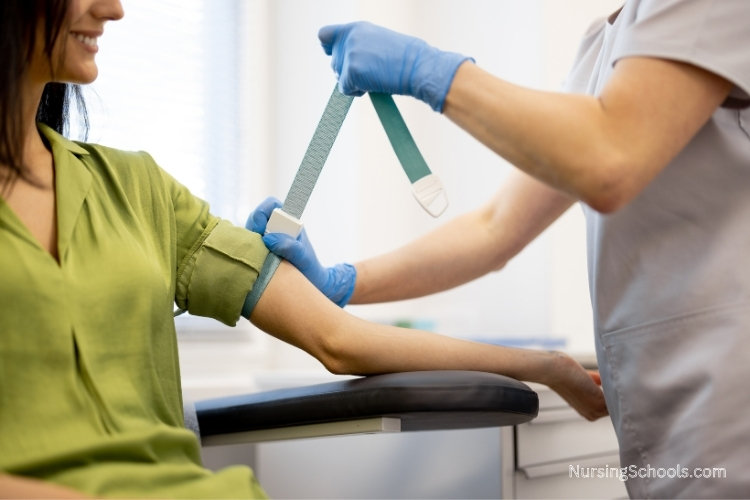
Average Salary
How Much Does an HIV/AIDS Nurse Make?
Salaries for HIV/AIDS Nurses vary based on experience, location, and work setting. On average, an HIV/AIDS Nurse can expect to earn between $70,000 and $95,000 annually.
Average annual salary for an HIV/AIDS Nurse:
- Entry-level: $70,000 - $80,000 per year.
- Mid-career: $80,000 - $90,000 per year.
- Experienced: $90,000 - $95,000 per year.
The U.S. Department of Labor reports that HIV/AIDS Nurses earn an average hourly wage of approximately $37.00 per hour. Assuming a 40-hour workweek, this equates to an annual salary of $76,960. The lowest 10% earn less than $31.00 per hour, while the highest 10% earn more than $45.00 per hour, resulting in an annual salary range of $64,480 to $93,600 per year.
Job Duties
What Does an HIV/AIDS Nurse Do?
HIV/AIDS Nurses provide both clinical care and emotional support to individuals affected by HIV/AIDS. Their responsibilities focus on disease management, prevention, and patient education.
The most common job duties of an HIV/AIDS Nurse:
- Administering Antiretroviral Therapy (ART). Monitor patients' adherence to ART medications and adjust treatment plans as needed.
- Educating Patients on Disease Management. Teach patients how to manage symptoms, prevent opportunistic infections, and maintain a healthy lifestyle.
- Providing Counseling and Emotional Support. Offer guidance and support to individuals coping with an HIV/AIDS diagnosis.
- Preventing Disease Transmission. Educate patients and the public on safe sex practices, harm reduction strategies, and pre-exposure prophylaxis (PrEP).
- Collaborating with Healthcare Teams. Work with physicians, social workers, and public health professionals to coordinate patient care.
- Monitoring for Opportunistic Infections. Assess patients for infections such as tuberculosis, pneumonia, and hepatitis that commonly affect those with HIV/AIDS.
- Advocating for Patient Rights. Help patients access healthcare services, support groups, and financial assistance programs.
- Advanced Duties. Experienced HIV/AIDS Nurses may participate in HIV research, work in policy advocacy, or lead community health initiatives.
HIV/AIDS Nurses primarily work in hospitals, public health agencies, infectious disease clinics, and nonprofit organizations. Their role is essential in providing holistic care to patients and helping to reduce the spread of HIV/AIDS.
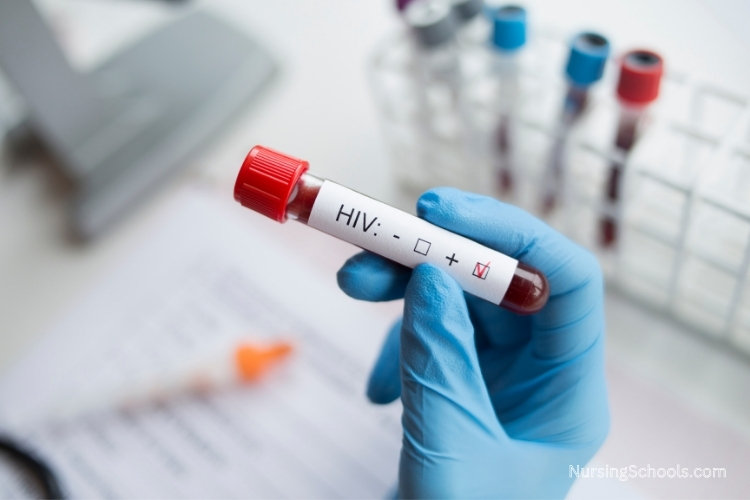
Essential Skills
What Skills Does an HIV/AIDS Nurse Need?
HIV/AIDS Nurses require a combination of clinical skills, patient education abilities, and advocacy expertise to provide effective care and support. These skills help them guide patients through treatment while promoting public health initiatives.
Here are some of the skills an HIV/AIDS Nurse needs to succeed:
- Infectious Disease Knowledge. Understand HIV/AIDS pathophysiology, treatment options, and emerging research.
- Patient Education. Clearly explain medication regimens, risk factors, and prevention strategies.
- Critical Thinking. Assess and adjust treatment plans based on the patient's health status and medication adherence.
- Communication. Provide compassionate counseling and build trust with patients facing stigma and discrimination.
- Collaboration. Work with multidisciplinary teams to ensure comprehensive care for individuals living with HIV/AIDS.
- Advocacy. Support policies and programs that improve access to HIV treatment and prevention services.
- Emotional Resilience. Provide ongoing support to patients dealing with complex medical and psychological challenges.
- Public Health Expertise. Engage in HIV/AIDS prevention efforts through outreach programs and community education.
One of the biggest challenges of being an HIV/AIDS Nurse is combating stigma and ensuring patients receive the support they need. However, the role is deeply rewarding, as it allows nurses to make a significant impact in improving health outcomes and promoting HIV/AIDS awareness.
Last updated: February 25, 2025
References:
- Registered Nurses. Bureau of Labor Statistics, U.S. Department of Labor. Occupational Outlook Handbook. Retrieved February 25, 2025.
- Registered Nurse (RN), Level 1 Salary in the United States. Salary.com. Retrieved February 25, 2025.
- HIV/AIDS Nurse. Johnson & Johnson, Nursing Careers. Retrieved February 25, 2025.
- Nursing Careers: Getting Started. American Nurses Association, Career Profile. Retrieved February 25, 2025.
- HIV/AIDS Nurse Education and Membership. Association of Nurses in AIDS Care (ANAC). Retrieved February 25, 2025.
- HIV Nursing Specialty. Duke University School of Nursing, Nursing Programs. Retrieved February 25, 2025.
- HIV Care and Prevention Concentration. University of California San Francisco, Master of Science Program. Retrieved February 25, 2025.

